|
|
|
Sort Order |
|
|
|
Items / Page
|
|
|
|
|
|
|
| Srl | Item |
| 1 |
ID:
160399
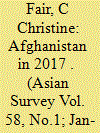

|
|
|
|
|
| Summary/Abstract |
The year 2017 witnessed continued challenges to the credibility and competence of the so-called National Unity Government in Kabul. President Ghani and Chief Executive Abdullah competed over the perquisites of power rather than collaborating to secure a viable future for their country. US and NATO forces remained at a stalemate with the Taliban, while Afghanistan’s predatory neighbors were as self-interested as ever. Hard-won gains remain reversible.
|
|
|
|
|
|
|
|
|
|
|
|
|
|
|
|
| 2 |
ID:
077150
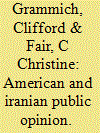

|
|
|
| 3 |
ID:
172477
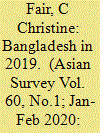

|
|
|
|
|
| Summary/Abstract |
After winning a third consecutive term as prime minister in the compromised December 2018 general election, Sheikh Hasina of the Awami League continues to consolidate one-woman rule. Throughout 2019, Hasina continued to persecute critics and opponents. Despite the deepening malaise of bad governance, Bangladesh has continued to enjoy impressive economic growth. But it remains haunted by the desperate Rohingya exodus from Myanmar, and the decades-old Bihari question.
|
|
|
|
|
|
|
|
|
|
|
|
|
|
|
|
| 4 |
ID:
110999
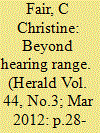

|
|
|
| 5 |
ID:
118377


|
|
|
|
|
| Publication |
2013.
|
| Summary/Abstract |
This report explores Iranian popular opinion on the Treaty on the Non-Proliferation of Nuclear Weapons (NPT) and the determinants of Iranian attitudes. Using data from a 2008 survey of 710 Iranians administered by the University of Maryland's Program on International Policy Attitudes, we find that that a significant minority of Iranians (10 percent in 2006 and 14 percent in 2008) would prefer that Iran withdraw from the NPT. Our statistical analysis shows that Iranians who fear a US attack on Iranian nuclear facilities and distrust the International Atomic Energy Agency are more likely to want to quit the NPT. We therefore argue that those who do not trust other nations are most likely to oppose the NPT.
|
|
|
|
|
|
|
|
|
|
|
|
|
|
|
|
| 6 |
ID:
154353
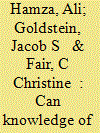

|
|
|
|
|
| Summary/Abstract |
In this research note we employ the work of Wiktorowicz who suggests that persons who are knowledgeable of Islam may be more capable of critically evaluating the claims of militant recruiters and ideologues and thus be more resistant to their appeals than those who are not knowledgeable. This gives rise to an interesting research question: Does knowledge of Islam reduce support for Islamist militancy? To evaluate this research question, we employ data derived from a nationally representative survey fielded among 16,279 Pakistanis in 2011. Using several survey items, we construct a “knowledge index” to measure respondents’ basic knowledge of Islam, which is our principal independent variable. To operationalize support for militancy we use two survey items that query respondents about their support for two prominent Islamist militant groups based in and from Pakistan: the Afghan Taliban as well the sectarian group, Sipah-e-Sahaba-e-Pakistan (also known as Lashkar-e-Jhangvi and Ahle Sunnat Wal Jamaat). We use ordinary least squares regression to evaluate the impact of our independent variables upon support for these two groups, controlling for other relevant factors. We find that knowledge of Islam does predict less support for these two groups; however, other variables such as sectarian organization and ethnicity have greater predictive power.
|
|
|
|
|
|
|
|
|
|
|
|
|
|
|
|
| 7 |
ID:
102366
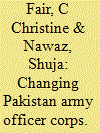

|
|
|
|
|
| Publication |
2011.
|
| Summary/Abstract |
The Pakistan Army elicits many concerns about terrorism, nuclear and the coherence of the state. However, very little is actually known about this institution. This article mobilizes unique data to address one important facet: the Army's geographical recruitment base. We find that the Pakistan Army has been successful at expanding the geographical recruitment base while some groups (namely those who are native to Sindh) remain highly under-represented. We also find that the officer corps is increasingly coming from urban areas. We conclude with a discussion of the implications of these important shifts subject to the limitations of our data.
|
|
|
|
|
|
|
|
|
|
|
|
|
|
|
|
| 8 |
ID:
101233
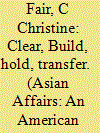

|
|
|
|
|
| Publication |
2010.
|
| Summary/Abstract |
After years of policy neglect under the Bush administration, President Barack Obama came into office with a firm resolve to achieve U.S. interests, variously defined, in Afghanistan. Most recently, Obama declared that by August 2011, the United States will begin making a conditions-based transfer of responsibility to Afghans under the mantra of "clear, hold, build, and transfer." In this article, the author evaluates the viability of this strategy. This article ultimately argues that this approach will prove inefficacious and calls for an immediate reconsideration of U.S. national security interests and appropriate contingency planning. Such an exercise will likely direct policy attention away from Afghanistan and toward Pakistan, where more U.S. security interests intersect than in Afghanistan.
|
|
|
|
|
|
|
|
|
|
|
|
|
|
|
|
| 9 |
ID:
080778
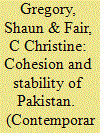

|
|
|
|
|
| Publication |
2008.
|
| Summary/Abstract |
Pakistan is becoming increasingly important in international security calculus, and the future trajectory of this nuclear weapons' state on the front line of the 'War on Terror' is of profound significance not only for South Asia but also for the international community. This article introduces an inaugural set of papers from the Pakistan Security Research Unit, established in 2007 at the University of Bradford, UK, focused on the cohesion and stability of Pakistan. The papers look at both the role of external players such as the United States and Afghanistan and at internal dynamics in Pakistan, with a particular emphasis on the role of the Pakistan military, on Kashmir and on jihadis (self-styled holy warriors) in the tribal belt.
|
|
|
|
|
|
|
|
|
|
|
|
|
|
|
|
| 10 |
ID:
084086


|
|
|
|
|
| Publication |
2008.
|
| Summary/Abstract |
This study examines the factors that lead household members to give or refuse consent for other household members to become a militant (or mujahid). Using data derived from a detailed survey fielded among a convenience sample of 141 families of slain militants in Pakistan, this manuscript seeks to explain why some families support participation in jihad and why some families do not. Using the extant literature on recruitment, participation in violent political conflict, and militant Islam as a guide, we posit how and why various household attributes should affect a household member to grant or refuse permission for another household member to wage jihad. We then test our hypotheses implied by our argument using data on households' financial, religious, and social characteristics. We conclude that a number of social, economic, and religious factors account for variation in household members' support of jihad.
|
|
|
|
|
|
|
|
|
|
|
|
|
|
|
|
| 11 |
ID:
059077
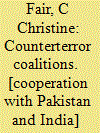

|
|
|
|
|
| Publication |
Santa Monica, Rand Corporation, 2004.
|
| Description |
xxi, 128p.
|
| Contents |
B
|
| Standard Number |
0833035592
|
|
|
|
|
|
|
|
|
|
|
|
Copies: C:1/I:0,R:0,Q:0
Circulation
| Accession# | Call# | Current Location | Status | Policy | Location |
| 049124 | 327.73054090511/FAI 049124 | Main | On Shelf | General | |
|
|
|
|
| 12 |
ID:
065297


|
|
|
| 13 |
ID:
084943


|
|
|
|
|
| Publication |
2008.
|
| Summary/Abstract |
Iran's nuclear programme has brought ever-sharpening conflict with Israel, the United States, and the European Union. The Iranian public has been actively drawn into this debate, as the Iranian government cultivates support for its actions and by foreign appeals for change (including Bush administration support for regime change). This article explores data relating to public support for Iran's nuclear program. We utilize data from a nationally representative, face-to-face poll fielded in Iran in late 2006. The poll (n = 1,000) queried respondents about numerous domestic and external security concerns, including Iran's 'full nuclear fuel cycle' program. We present data on Iranian beliefs about Iran's nuclear program and the determinants of those beliefs. After discussing poll methodology and data integrity, the paper presents summary statistics on key variables about the nuclear program. We estimate three logit models to explain respondent beliefs about the program. The dependent variables address support for the program, the economic importance of the nuclear program, and beliefs that Iran will weaponize. Iranians' support for the program correlates with perceived status and deterrence benefits conferred by the program and opinions of the United States. Respondents' concerns about Israel do not drive support for the program. The paper concludes with a discussion of lessons learned from this study for future work of this type in Iran or other coercive environments.
|
|
|
|
|
|
|
|
|
|
|
|
|
|
|
|
| 14 |
ID:
181961
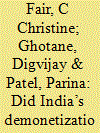

|
|
|
|
|
| Summary/Abstract |
On 9 November 2016, India’s Prime Minister Narendra Modi announced his ‘demonetization’ policy which rendered all Rs. 500 and Rs. 1000 notes null and void. His government claimed that this policy, among other things, would curb stone-pelting in India’s restive Jammu and Kashmir by rendering valueless the copious illegal currency that, according to India, Pakistan pumped into the state to pay protestors to throw stones. Subsequently, New Delhi claimed success despite countervailing evidence for this claim. Here, we assemble a novel dataset to evaluate these assertions. After controlling for other factors that may explain variation in stone-pelting, we find that demonetization corresponded to increased stone-pelting. This finding is important for at least two reasons. First, Indian efforts to depict all protests in Jammu and Kashmir as the result of Pakistani payments both delegitimize Kashmiris’ grievances by reducing them to anti-state behaviors and diminish public appetite for addressing those grievances. Second, the current populist Indian government, which caters to Hindu nationalists, selectively curates facts to justify its actions, big and small, to the detriment of democratic accountability and governance.
|
|
|
|
|
|
|
|
|
|
|
|
|
|
|
|
| 15 |
ID:
131472
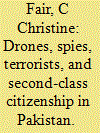

|
|
|
|
|
| Publication |
2014.
|
| Summary/Abstract |
This essay reviews seven recent books and reports that focus upon the use of US armed drones in Pakistan's Federally Administered Tribal Areas (FATA). This essay synthesizes a historical account of the program, critically interrogates key arguments and evidence advanced by the authors, and draws attention the particular problems that confront those who live in the FATA and the second-class citizenship that the Pakistani state has bestowed upon them for reasons of domestic and foreign policy concerns. This review essay does not intend to be the final word on any of the ongoing policy debates. But it does hope to enable a wider audience to take part in these important deliberations.
|
|
|
|
|
|
|
|
|
|
|
|
|
|
|
|
| 16 |
ID:
080784
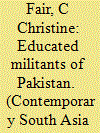

|
|
|
|
|
| Publication |
2008.
|
| Summary/Abstract |
This paper presents preliminary findings from a survey of 141 militant households in Pakistan, focusing on the background of slain militants in those households. The militants in the sample are well educated and are not predominantly emerging from Pakistan's religious seminaries as is often suggested. This essay considers Pakistan's policy options and constraints as Islamist militancy looms as Pakistan's single most important security concern. Given that militant groups in Pakistan have been state-sponsored actors, militancy will not go away until Pakistan makes a strategic decision to abandon the use of proxies as tools of foreign policy. However, in recent years, many of these once proxies have turned against the state. Effective policy measures to contain these groups are likely to elude the Pakistani Government, posing great risk to Pakistan, the region and the international community
|
|
|
|
|
|
|
|
|
|
|
|
|
|
|
|
| 17 |
ID:
111782
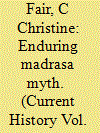

|
|
|
|
|
| Publication |
2012.
|
| Summary/Abstract |
"[W]idespread acceptance of the purported ties between Islamic schools and militancy in Pakistan relies on a number of empirically flawed assumptions and assertions…."
|
|
|
|
|
|
|
|
|
|
|
|
|
|
|
|
| 18 |
ID:
131758
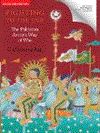

|
|
|
|
|
| Publication |
Oxford, Oxford University Press, 2014.
|
| Description |
xv, 347p.Hbk
|
| Standard Number |
9780199454686
|
|
|
|
|
|
|
|
|
|
|
|
Copies: C:1/I:0,R:0,Q:0
Circulation
| Accession# | Call# | Current Location | Status | Policy | Location |
| 057827 | 355.03355491/FAI 057827 | Main | On Shelf | General | |
|
|
|
|
| 19 |
ID:
078299
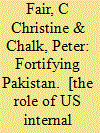

|
|
|
|
|
| Publication |
Washington, DC, United States Institute of Peace Press, 2006.
|
| Description |
xxi, 165p.
|
| Series |
Perspectives series
|
| Standard Number |
9781929223886
|
|
|
|
|
|
|
|
|
|
|
|
Copies: C:1/I:0,R:0,Q:0
Circulation
| Accession# | Call# | Current Location | Status | Policy | Location |
| 052450 | 355.03254910973/FAI 052450 | Main | On Shelf | General | |
|
|
|
|
| 20 |
ID:
049700


|
|
|
|
|
| Publication |
Santa Monica, Rand Corporation, 2003.
|
| Description |
xxviii, 105p.
|
| Standard Number |
083303443X
|
|
|
|
|
|
|
|
|
|
|
|
Copies: C:1/I:0,R:0,Q:0
Circulation
| Accession# | Call# | Current Location | Status | Policy | Location |
| 047328 | 355.2230973/FRI 047328 | Main | On Shelf | General | |
|
|
|
|
|
|
|
|
|